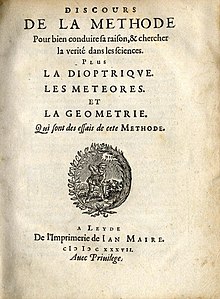Our website is made possible by displaying online advertisements to our visitors.
Please consider supporting us by disabling your ad blocker.
Discourse on the Method
 Discourse on the Method | |
| Author | René Descartes |
|---|---|
| Original title | Discours de la Méthode Pour bien conduire sa raison, et chercher la vérité dans les sciences |
| Language | French |
| Subject | Philosophy and autobiography |
Publication date | 1637 |
Original text | Discours de la Méthode Pour bien conduire sa raison, et chercher la vérité dans les sciences at French Wikisource |
| Translation | Discourse on the Method at Wikisource |
| Part of a series on |
| René Descartes |
|---|
 |
Discourse on the Method of Rightly Conducting One's Reason and of Seeking Truth in the Sciences (French: Discours de la Méthode pour bien conduire sa raison, et chercher la vérité dans les sciences) is a philosophical and autobiographical treatise published by René Descartes in 1637. It is best known as the source of the famous quotation "Je pense, donc je suis" ("I think, therefore I am", or "I am thinking, therefore I exist"),[1] which occurs in Part IV of the work. A similar argument, without this precise wording, is found in Meditations on First Philosophy (1641), and a Latin version of the same statement Cogito, ergo sum is found in Principles of Philosophy (1644).
Discourse on the Method is one of the most influential works in the history of modern philosophy, and important to the development of natural sciences.[2] In this work, Descartes tackles the problem of skepticism, which had previously been studied by other philosophers. While addressing some of his predecessors and contemporaries, Descartes modified their approach to account for a truth he found to be incontrovertible; he started his line of reasoning by doubting everything, so as to assess the world from a fresh perspective, clear of any preconceived notions.
The book was originally published in Leiden, in the Netherlands. Later, it was translated into Latin and published in 1656 in Amsterdam. The book was intended as an introduction to three works: Dioptrique, Météores, and Géométrie. Géométrie contains Descartes's initial concepts that later developed into the Cartesian coordinate system. The text was written and published in French so as to reach a wider audience than Latin, the language in which most philosophical and scientific texts were written and published at that time, would have allowed.[3] Most of Descartes' other works were written in Latin.
Together with Meditations on First Philosophy, Principles of Philosophy and Rules for the Direction of the Mind, it forms the base of the epistemology known as Cartesianism.
- ^ Garber, Daniel. [1998] 2003. "The Cogito Argument | Descartes, René Archived 2021-09-15 at the Wayback Machine." In Routledge Encyclopedia of Philosophy, edited by E. Craig. London: Routledge. Retrieved 2017-11-12.
- ^ Davis, Philip J., and Reuben Hersh. 1986. Descartes' Dream: The World According to Mathematics. Cambridge, MA: Harcourt Brace Jovanovich.
- ^ Burns, William E. (2001). The scientific revolution: an encyclopedia. Santa Barbara, Calif.: ABC-CLIO. ISBN 978-0-87436-875-8.
Previous Page Next Page


